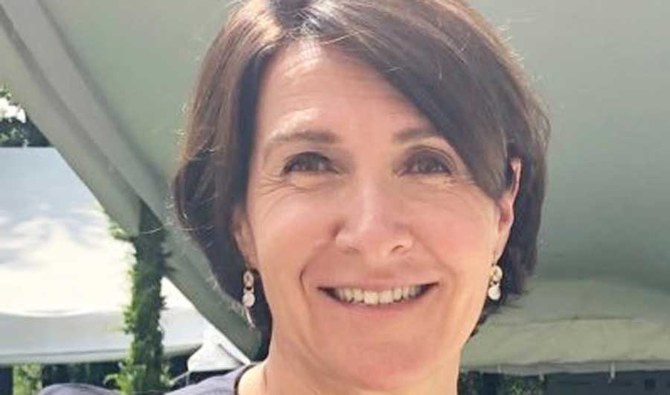
By NAJIA HOUSSARI -- arabnews.com -- Ambassador Anne Grillo responded after caretaker PM Hassan Diab accused the international community of ‘punishing the Lebanese’ Crisis is due to ‘mismanagement by the successive officials, who are still making mistakes; it is not the result of an external blockade’ BEIRUT: Anne Grillo, the French ambassador to Lebanon, on Tuesday said that the blame for the crisis in the country lies squarely with a succession of ruling authorities. She was responding to comments by caretaker Prime Minister Hassan Diab, who accused the international community of “punishing the Lebanese and turning its back on Lebanon, while pressuring and besieging the country.” Grillo said: “The current situation in Lebanon is the result of mismanagement by the successive officials, who are still making mistakes; it is not the result of an external blockade. “The world is already helping the Lebanese and not waiting for an invitation to a meeting to help them.”
Earlier in the day Diab called the ambassadors and other representatives of diplomatic missions and international organizations to a meeting at his Grand Serail offices and delivered a speech in which he called on “the world to save Lebanon.” He said: “The severe crises experienced by the Lebanese people at various levels are pushing toward a major catastrophe whose repercussions cannot be contained. The Lebanese are facing a dark fate. The picture has become clear: Lebanon and the Lebanese are on the brink of a disaster. “The danger that threatens the Lebanese will not be limited to them. When we hit rock bottom, the repercussions will resonate outside Lebanon’s geography. No one will be able to isolate themselves from the risk of Lebanon’s collapse. “Lebanese stability is the basis for regional stability. With the presence of about 1.5 million Syrian refugees and hundreds of thousands of Palestinian refugees, it will be difficult to predict the consequences of Lebanon’s stability falling apart.”
كفانا صراخاً وعويلاً على الحالة التي وصلنا اليها بسبب سوء ادارتنا وخلافاتنا ومصالحنا، قليل من العجرفة والغرور وقليل من التواضع والحوار ووقف …

by middle-east-online.com -- NIHA - In a village in Lebanon’s scenic Chouf Mountains, 69-year-old Chafik Mershad pulls out a massive rectangular guestbook and reads out despairingly the date when he hosted his last visitor: November 16, 2019. A month earlier, anti-government protests had exploded across the country over taxes and a deteriorating currency crisis. Amid such uncertainty, few people visited his guesthouse. Then came the coronavirus and subsequent government-imposed lockdowns. The guesthouse officially closed its doors in February 2020. A year and a half later, he still has no plans to reopen amid the country’s current financial meltdown. “Corona really affected us, but the biggest thing was the currency crisis,” Mershad said, speaking at his home above the guesthouse. “We used to offer meals for guests with Nescafe, tea, whatever they wanted for a cheap price. Now, one hamburger patty costs that much.”
The dual shocks of the pandemic and a devastating financial crisis have gutted the hospitality sector of this Mediterranean nation, known for its beaches, mountain resorts and good food. Hundreds of businesses, including guesthouses like the Mershad Guesthouse, have been forced to close. But as pandemic restrictions are being eased, the businesses that survived hope the dollars spent by visiting Lebanese expats and an increase in domestic tourism can get the wheels of the economy moving again. Currently, most hotel reservations are from Lebanese expats and some foreigners from neighboring Iraq, Egypt and Jordan. Airport arrivals are picking up: Every day for the past several weeks, the Beirut Airport has had four flights coming from Iraq, with more than 700 passengers in total, according to Jean Abboud, president of the Travel and Tourist Agents Union. Chaotic scenes have been reported at the arrivals lounge as people crowd for the obligatory PCR test.

By NAJIA HOUSSARI -- arabnews.com -- BEIRUT: Doctors and pharmacists raised their voices on Monday in protest against the lack of medicine amid the deteriorating Lebanese currency crisis. In a growing spate of crises, shortages of fuel and medicine continued over the weekend. These materials, as well as the food supply, are imported. Food prices have soared. The price of sunflower oil has jumped by over 1,100 percent since the summer of 2019. The price of beef and rice has risen by 627 percent and 545 percent respectively over the same period. The price of eggs has shot up by 450 percent, with labneh (Strained yogurt) costs jumping 275 percent. Lebanese TV and social media circulated images of people screaming in the streets for milk and medicine, and electricity to save seriously ill children, who need oxygen devices in their homes.
Pharmacist Samer Soubra told Arab News: “People come to the pharmacy to ask for simple medicines, such as ear drops, but I do not have them.” Soubra added: “I think that importers have a stockpile of medicines, but they refrain from distributing them to put pressure on the Banque du Liban to continue subsidizing medicine. “There is no political decision yet to lift subsidies on medicine. It’s chaos. “I expect within 10 days the scream will rise because sick people will get worse without treatment.” Dr. Ismail Sukkarieh, a gastroenterologist, told Arab News: “A colleague of mine, a cardiologist, was not able to install a spring into a patient’s artery because there was no blood thinner and left him at the mercy of those who trade in people’s health.” Dr. Sukkarieh pointed out that “the most missing medicines are those related to arterial hypertension and blood clots, and we do not know the reason.” He asked: “How can I believe the importers who say that their drug stores are empty? It is a blackmail operation against the Banque du Liban.” Dr. Sukkarieh held “those concerned with resolving the drug crisis responsible for any harm to, or death of any patient.”
Khazen History


Historical Feature:
Churches and Monasteries of the Khazen family

St. Anthony of Padua Church in Ballouneh
Mar Abda Church in Bakaatit Kanaan
Saint Michael Church in Bkaatouta
Saint Therese Church in Qolayaat
Saint Simeon Stylites (مار سمعان العامودي) Church In Ajaltoun
Virgin Mary Church (سيدة المعونات) in Sheilé
Assumption of Mary Church in Ballouneh
1 - The sword of the Maronite Prince
2 - LES KHAZEN CONSULS DE FRANCE
3 - LES MARONITES & LES KHAZEN
4 - LES MAAN & LES KHAZEN
5 - ORIGINE DE LA FAMILLE
Population Movements to Keserwan - The Khazens and The Maans
ما جاء عن الثورة في المقاطعة الكسروانية
ثورة أهالي كسروان على المشايخ الخوازنة وأسبابها
Origins of the "Prince of Maronite" Title
Growing diversity: the Khazin sheiks and the clergy in the first decades of the 18th century
Historical Members:
Barbar Beik El Khazen [English]
Patriach Toubia Kaiss El Khazen(Biography & Life Part1 Part2) (Arabic)
Patriach Youssef Dargham El Khazen (Cont'd)
Cheikh Bishara Jafal El Khazen
Patriarch Youssef Raji El Khazen
The Martyrs Cheikh Philippe & Cheikh Farid El Khazen
Cheikh Nawfal El Khazen (Consul De France)
Cheikh Hossun El Khazen (Consul De France)
Cheikh Abou-Nawfal El Khazen (Consul De France)
Cheikh Francis Abee Nader & his son Yousef
Cheikh Abou-Kanso El Khazen (Consul De France)
Cheikh Abou Nader El Khazen
Cheikh Chafic El Khazen
Cheikh Keserwan El Khazen
Cheikh Serhal El Khazen [English]
Cheikh Rafiq El Khazen [English]
Cheikh Hanna El Khazen
Cheikha Arzi El Khazen
Marie El Khazen